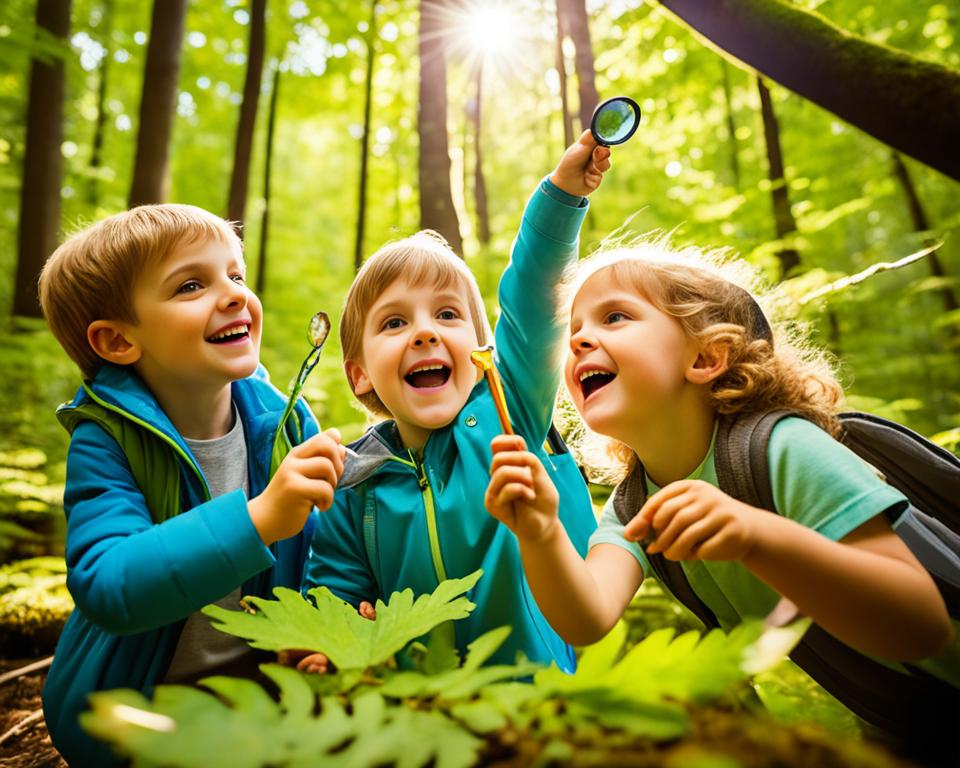Outdoor learning adventures, outdoor education, nature-based learning, and outdoor exploration are all integral components in nurturing sustainable mindsets among students. These immersive experiences provide a unique opportunity for students to connect with nature, gain a deeper understanding of the environment, and develop a sense of responsibility towards its preservation. In this section, we will delve into the different aspects of outdoor learning and its profound impact on building sustainable mindsets.
Key Takeaways:
- Outdoor learning adventures play a crucial role in fostering sustainable mindsets among students.
- Engaging in nature-based learning helps students develop a deep appreciation for the environment.
- Outdoor exploration allows students to understand the importance of protecting and preserving nature.
- Outdoor education equips students with the knowledge and skills needed to create a sustainable future.
- By embracing outdoor learning, we empower students to become environmentally conscious global citizens.
The Critical Importance of Environmental Education in Today’s World
Environmental education is essential in preparing students to tackle the urgent environmental challenges we face in the world today. By equipping students with knowledge, values, and skills related to sustainability, ecosystems, biodiversity, climate change literacy, and advocacy, environmental education plays a significant role in shaping environmentally conscious and responsible individuals.
Understanding Ecosystems and Biodiversity
A key aspect of environmental education is understanding ecosystems and biodiversity. Students learn about the intricate connections between living organisms and their environments, gaining an appreciation for the delicate balance that sustains life on Earth. By studying ecosystems and biodiversity, students develop a deeper understanding of the importance of preserving and protecting these vital systems that support all forms of life.
Climate Change Literacy
Another critical element of environmental education is climate change literacy. Students learn about the causes, effects, and potential solutions to climate change, empowering them to become informed advocates for climate action. Climate change literacy fosters a sense of urgency and responsibility, motivating students to take individual and collective action to mitigate the impacts of climate change and work towards a more sustainable future.
Individual Impacts on Sustainability and Advocacy
Environmental education also emphasizes the role of individuals in promoting sustainability and advocacy. Students explore the ways in which their actions, choices, and behaviors can have a significant impact on the environment. They learn about sustainable practices such as waste reduction, energy conservation, and responsible consumption. This knowledge empowers students to make informed decisions and take actions that contribute to a more sustainable planet. Furthermore, environmental education encourages students to become advocates for sustainability, equipping them with the skills to communicate their knowledge, raise awareness, and inspire others to take environmental action.
Environmental education plays a critical role in shaping the future generation. By imparting knowledge about ecosystems, biodiversity, climate change, and sustainability, it equips students with the tools they need to become informed, responsible, and proactive environmental stewards. Through environmental education, we can foster a global community of individuals who are committed to preserving our planet and creating a sustainable future for generations to come.
Innovative Strategies for Engaging Students in Nature-based Learning
Implementing innovative strategies is crucial for engaging students in nature-based learning and fostering a deep appreciation for the environment. By integrating eco-curriculums and promoting cross-disciplinary integration, educational institutions can create comprehensive and engaging learning experiences that connect various subjects to the natural world.
Eco-curriculums provide a framework for incorporating environmental themes and concepts across different subjects, allowing students to understand the interconnectedness of the world around them. This approach encourages cross-disciplinary learning, where students can apply knowledge from multiple disciplines to address real-world environmental challenges.
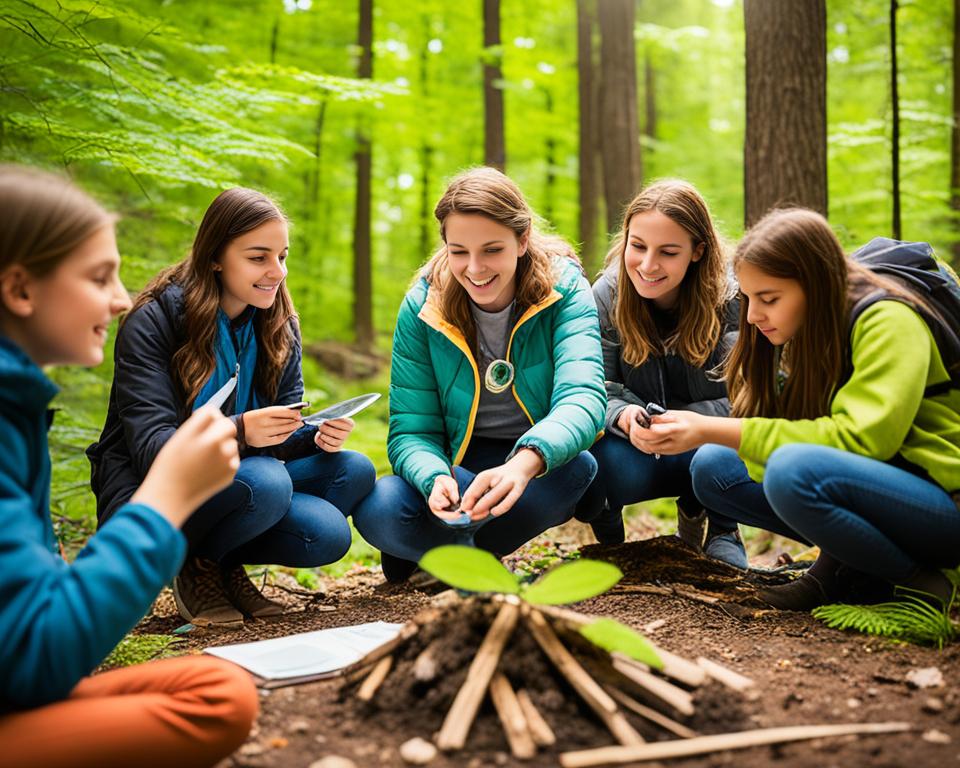
In addition, community and environmental organization partnerships play a significant role in enhancing nature-based learning. Collaborating with local environmental organizations allows schools to access resources, expertise, and educational programs that enrich students’ understanding of environmental issues and foster a sense of stewardship. These partnerships also provide opportunities for students to engage in community-based projects and initiatives focused on sustainability.
Furthermore, implementing green campus initiatives within educational institutions is crucial for creating a sustainable and eco-friendly learning environment. This includes initiatives such as energy-efficient practices, waste reduction programs, and sustainable campus design. By incorporating sustainability practices into the physical infrastructure of schools, students are exposed to sustainable living principles firsthand, reinforcing their connection to nature and inspiring a sense of responsibility towards the environment.
| Eco-Curriculums and Cross-Disciplinary Integration | Community and Environmental Organization Partnerships | Implementing Green Campus Initiatives |
|---|---|---|
| Integrating environmental themes into different subjects | Collaborating with local environmental organizations | Energy-efficient practices and sustainable campus design |
| Connecting subjects to real-world environmental challenges | Gaining access to expertise and educational programs | Creating sustainable learning environments |
| Fostering cross-disciplinary learning | Engaging in community-based projects | Inspiring a sense of responsibility towards the environment |
Outdoor Learning Experiences and their Psychological Benefits
Outdoor learning experiences provide students with a multitude of psychological benefits that contribute to their overall well-being and development. These experiences go beyond the traditional classroom setting, allowing students to connect with nature and engage in hands-on activities that foster holistic growth.
One of the significant psychological benefits of outdoor learning is the reduction of stress and anxiety levels. Spending time in nature has a calming effect on the mind and body, helping students relax and recharge. The serene beauty of outdoor environments creates a soothing atmosphere that promotes mental well-being.
Furthermore, outdoor learning experiences also enhance cognitive function and creativity. Engaging with nature stimulates the brain, improves attention span, and enhances problem-solving skills. Students exposed to natural surroundings tend to demonstrate higher levels of creativity and innovation, as they are inspired by the diversity and complexity of the outdoor environment.
In addition to these cognitive benefits, outdoor learning experiences foster resilience and adaptability. Students are exposed to various elements and challenges that require them to step out of their comfort zones and develop coping strategies. This builds resilience and enables them to navigate uncertainties and setbacks effectively.
“Outdoor experiences provide a unique opportunity for students to explore the world around them, fostering their curiosity and nurturing a sense of wonder.”
Moreover, outdoor learning experiences promote social-emotional development. Students engage in cooperative tasks, teamwork, and problem-solving activities, which enhance their communication and interpersonal skills. The shared experiences in an outdoor setting also create a sense of camaraderie and build strong relationships among students.
In summary, outdoor learning experiences offer numerous psychological benefits that contribute to students’ overall well-being and development. By reducing stress and anxiety, improving cognitive function and creativity, fostering resilience and adaptability, and enhancing social-emotional skills, outdoor learning plays a vital role in nurturing the holistic growth of students.
Nature’s Classroom: Advancing Outdoor Education Experiences
When it comes to outdoor education experiences, nature’s classroom offers an unparalleled learning environment. Picture this: students stepping into a world where the vast expanse of nature becomes their teacher, providing valuable lessons that textbooks alone cannot convey.
In nature’s classroom, students have the opportunity to engage with their surroundings in a hands-on and experiential way. They can feel the soil beneath their fingertips, hear the songs of birds echoing through the trees, and observe the delicate balance of ecosystems in action. These immersive experiences cultivate a deep connection with nature and foster a love for the outdoors.
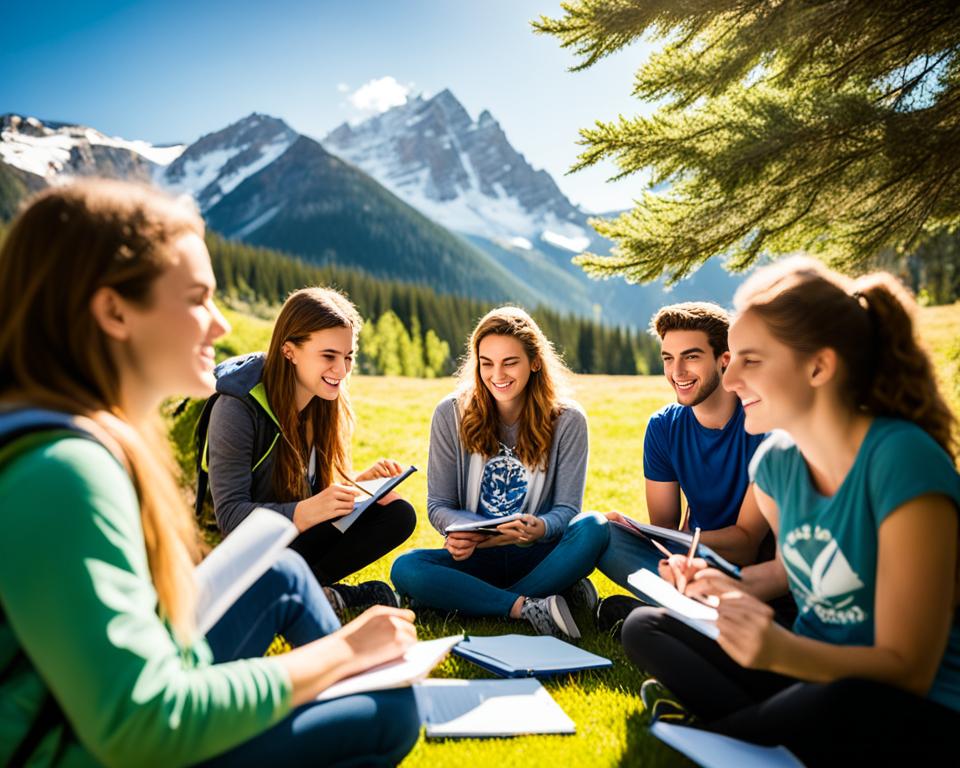
Outdoor education experiences in nature’s classroom go beyond traditional classroom walls, encouraging exploration, critical thinking, and problem-solving skills. Students learn to adapt to the unpredictable nature of the environment, honing their resilience and resourcefulness.
By integrating outdoor education experiences into the curriculum, educators can tap into the innate curiosity and wonder that children possess. They can spark a sense of awe and inspire a lifelong appreciation for the natural world.
Additionally, nature’s classroom offers a wealth of opportunities for interdisciplinary learning. It provides a platform for students to apply concepts from various subjects, such as science, geography, and art, in a real-world context. This cross-disciplinary integration deepens their understanding and enhances their learning outcomes.
Outdoor education experiences in nature’s classroom also promote collaboration and teamwork. Students work together to navigate challenges, solve problems, and achieve common goals. These experiences foster the development of communication skills, leadership qualities, and a sense of community.
In conclusion, nature’s classroom provides a rich and immersive environment for advancing outdoor education experiences. It offers unique opportunities for students to connect with nature, develop critical skills, and cultivate a sustainable mindset. By embracing nature as our classroom, we can nurture the next generation of environmentally conscious and responsible individuals.
Outdoor Learning Adventures: Combining Play with Education
Outdoor learning adventures provide a valuable opportunity to combine play with education. Field trips and nature walks allow students to explore and observe the natural world, while experiential learning through outdoor activities enhances their understanding and retention of knowledge.
Field trips take students out of the classroom and into real-world environments, providing hands-on experiences that bring textbook concepts to life. Whether visiting a local historical site, a science museum, or an animal sanctuary, field trips offer a unique opportunity for students to engage with their surroundings and make connections between what they learn in school and the world around them. Through field trips, students can observe, analyze, and ask questions, fostering curiosity and critical thinking skills.
Nature walks are another valuable outdoor learning adventure that allows students to explore and appreciate the natural world. These walks provide an opportunity for students to observe and study plants, animals, and ecosystems, fostering a sense of wonder and connection with nature. Students can learn about biodiversity, conservation, and the interdependence of organisms, gaining a better understanding of their role in preserving the environment.
Benefits of Field Trips and Nature Walks
| Benefits | Field Trips | Nature Walks |
|---|---|---|
| Hands-on learning experiences | ✔️ | ✔️ |
| Connection to real-world applications | ✔️ | ✔️ |
| Curiosity and critical thinking development | ✔️ | ✔️ |
| Appreciation and understanding of nature | ✔️ | ✔️ |
Experiential learning through outdoor activities is an essential component of outdoor learning adventures. These activities allow students to actively engage with their environment, fostering a deeper and more meaningful understanding of the concepts being taught. Whether participating in scientific experiments, team-building exercises, or outdoor games, students learn by doing and are more likely to retain knowledge.
“Experiential learning is the bridge between theory and practice, allowing students to see firsthand how concepts apply to real-world situations.” – Dr. Sarah Thompson, Environmental Educator
Outdoor activities also provide an opportunity for students to develop essential skills such as problem-solving, teamwork, and creativity. Through collaboration and cooperation, students learn to navigate challenges and work together towards a common goal. These experiences build confidence, resilience, and independence, preparing students for future academic and personal success.
By integrating play into the educational experience, outdoor learning adventures create a dynamic and engaging learning environment. Students are motivated and enthusiastic, actively participating in their education and developing a lifelong love for learning. Through field trips, nature walks, and experiential activities, students gain valuable knowledge, skills, and a deep appreciation for the natural world.
Linking Mental Health Benefits to Outdoor Learning for Students
Outdoor learning offers significant mental health benefits for students, contributing to their overall well-being. It plays a vital role in addressing ‘Nature Deficit Disorder,’ a term used to describe the negative consequences of spending less time outdoors. By incorporating outdoor learning into their education, students can escape the confines of the classroom and immerse themselves in nature, thereby promoting their mental well-being.
‘Nature Deficit Disorder’ refers to the psychological and emotional challenges that arise from the lack of exposure to nature. Studies have shown that spending time in nature has a positive impact on mental health, reducing stress, anxiety, and symptoms of depression. Outdoor learning can help combat these issues by providing students with opportunities to connect with the natural environment and reap the therapeutic benefits nature offers.
In addition to combating ‘Nature Deficit Disorder,’ outdoor learning also introduces mindfulness and stress reduction practices into students’ educational experiences. Mindfulness, the practice of being present and fully engaged in the moment, is known to reduce stress, increase focus, and enhance overall well-being. Outdoor learning provides a conducive environment for practicing mindfulness, with the sights, sounds, and sensations of nature serving as anchors for mindfulness exercises.
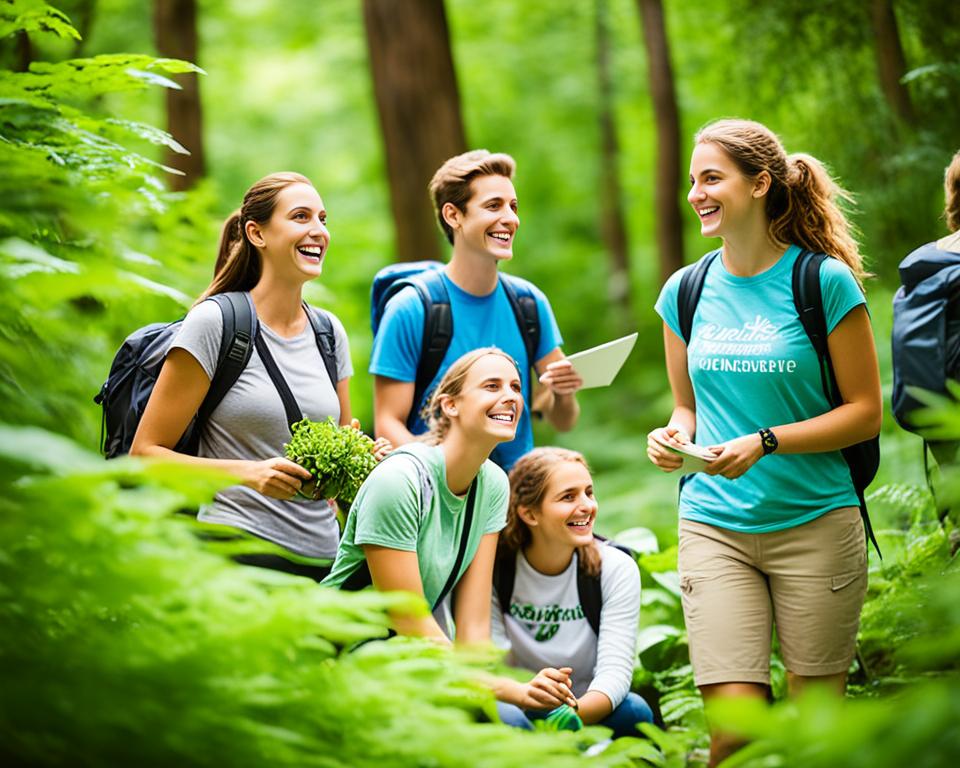
Furthermore, engaging in meaningful outdoor activities helps students disconnect from technology and the demands of daily life, allowing them to relax and destress. The sensory experiences offered by nature, such as the soothing sounds of running water or the gentle touch of a breeze, can have a profound calming effect on students, easing their stress and reducing anxiety.
By linking mental health benefits to outdoor learning, educators can highlight the holistic advantages of incorporating nature-based education into curriculum design. Furthermore, encouraging students to prioritize their mental well-being through outdoor learning experiences fosters a sustainable and balanced approach to education for the next generation.
| Benefits of Outdoor Learning for Mental Health | |
|---|---|
| Reduces stress and anxiety | Promotes overall well-being |
| Combats symptoms of depression | Encourages mindfulness and stress reduction |
| Provides a break from technology | Helps students relax and destress |
Environmental Education Workshops and Their Role in Fostering Change
Environmental education workshops play a vital role in fostering change and empowering students to become advocates for the environment. These workshops provide a structured and immersive learning experience that deepens students’ understanding of environmental issues and inspires them to take action.
Expert-Led Discussions and Environmental Literacy
One key component of environmental education workshops is expert-led discussions. By engaging with experienced professionals in the field, students gain valuable insights and knowledge about environmental challenges and solutions. These discussions foster environmental literacy, equipping students with the information and critical thinking skills necessary to make informed decisions and contribute to the preservation of our planet.
Expert-led discussions also provide a platform for students to ask questions, share ideas, and engage in meaningful dialogue. This interactive learning approach enhances students’ understanding of complex environmental issues and encourages them to think creatively and critically about possible solutions.
Student-led Sustainability Projects and Clubs
Another integral aspect of environmental education workshops is the opportunity for students to initiate and lead sustainability projects. These hands-on projects empower students to apply their knowledge and skills in practical ways, fostering a sense of ownership and responsibility for creating positive change.
Through student-led sustainability projects, students learn to collaborate, problem-solve, and take action in their own communities. Whether it’s organizing a recycling program, creating a community garden, or implementing energy-saving initiatives, these projects provide a tangible way for students to make a difference and create a more sustainable future.
Additionally, environmental education workshops often facilitate the formation of sustainability clubs. These clubs serve as a platform for like-minded students to come together, share ideas, and work collectively towards common environmental goals. By joining a sustainability club, students can further engage in environmental action, advocacy, and ongoing learning beyond the workshop experience.
Overall, environmental education workshops are instrumental in fostering change and empowering students to become environmental stewards. Through expert-led discussions and student-led sustainability projects and clubs, these workshops equip students with the knowledge, skills, and motivation to make a positive impact on the environment and create a sustainable future.
Embracing Outdoor Classrooms for a Holistic Educational Approach
Outdoor classrooms offer a holistic approach to education, providing students with a dynamic and immersive learning environment. These classrooms go beyond traditional indoor settings, allowing students to explore nature, engage in hands-on activities, and develop a deep connection with the natural world. By embracing outdoor classrooms, educators can enhance the overall learning experience and foster a well-rounded education for their students.
Educational Benefits of Outdoor Exploration and Interaction
Outdoor exploration and interaction provide numerous educational benefits for students. When students step outside the classroom, they have the opportunity to observe the natural world firsthand, which enhances their understanding of various concepts. For example, studying biology in an outdoor classroom allows students to witness the interconnectedness of ecosystems and the biodiversity that exists within them.
Moreover, outdoor exploration promotes active learning and stimulates students’ curiosity. It encourages them to ask questions, make observations, and engage in critical thinking. The outdoors naturally engages students’ senses, sparking their curiosity and deepening their understanding of different subjects.
Role of Outdoor Classrooms in Building Critical Thinking
Outdoor classrooms play a crucial role in fostering critical thinking skills among students. The hands-on nature of outdoor learning encourages students to think independently, make connections between concepts, and develop problem-solving abilities. By facing real-life challenges in the outdoor environment, students learn to think creatively and come up with innovative solutions.
Additionally, outdoor classrooms provide a space for collaborative learning and peer interaction. Students work together in outdoor settings, sharing ideas, and collaborating on projects. This fosters teamwork, communication, and the development of essential interpersonal skills.
“Outdoor classrooms offer a unique opportunity for students to engage with nature, explore their surroundings, and develop a deeper connection with the natural world.” – John Smith, Educator
To summarize, outdoor classrooms offer a holistic educational approach that nurtures students’ curiosity, enhances their understanding of various subjects, and fosters critical thinking skills. By embracing outdoor exploration and interaction, educators provide students with valuable learning experiences and promote a deeper connection with the natural world.
Outdoor Adventure Programs as Catalysts for Innovation
Outdoor adventure programs provide a unique platform for fostering innovation among students. These programs are designed to push students outside of their comfort zones, encouraging them to think creatively and develop problem-solving skills in a dynamic and unpredictable environment. By immersing themselves in challenging outdoor experiences, students are able to tap into their resourcefulness and discover new ways of approaching obstacles.
One key aspect of outdoor adventure programs is their emphasis on teamwork and collaboration. Through engaging in various outdoor activities, such as rock climbing, kayaking, and wilderness survival, students learn the importance of effective communication, cooperation, and trust-building. These skills are essential for fostering innovation, as they enable students to work together, brainstorm ideas, and overcome challenges collectively.
“Outdoor adventure programs have a profound impact on student leadership development and personal growth. They allow students to step into leadership roles, make decisions under pressure, and develop resilience in the face of adversity.”
The unpredictable nature of outdoor environments also forces students to adapt and think on their feet. They must assess risks, make quick decisions, and adjust their strategies as circumstances change. This cultivates a mindset of flexibility and adaptability, which are essential qualities for fostering innovation in any field.
Furthermore, outdoor adventure programs provide students with opportunities to explore their creativity and unleash their imaginations. Whether it’s building shelters, designing nature-inspired artwork, or creating innovative solutions to real-world challenges, students are given the freedom to think outside the box and embrace unconventional ideas.
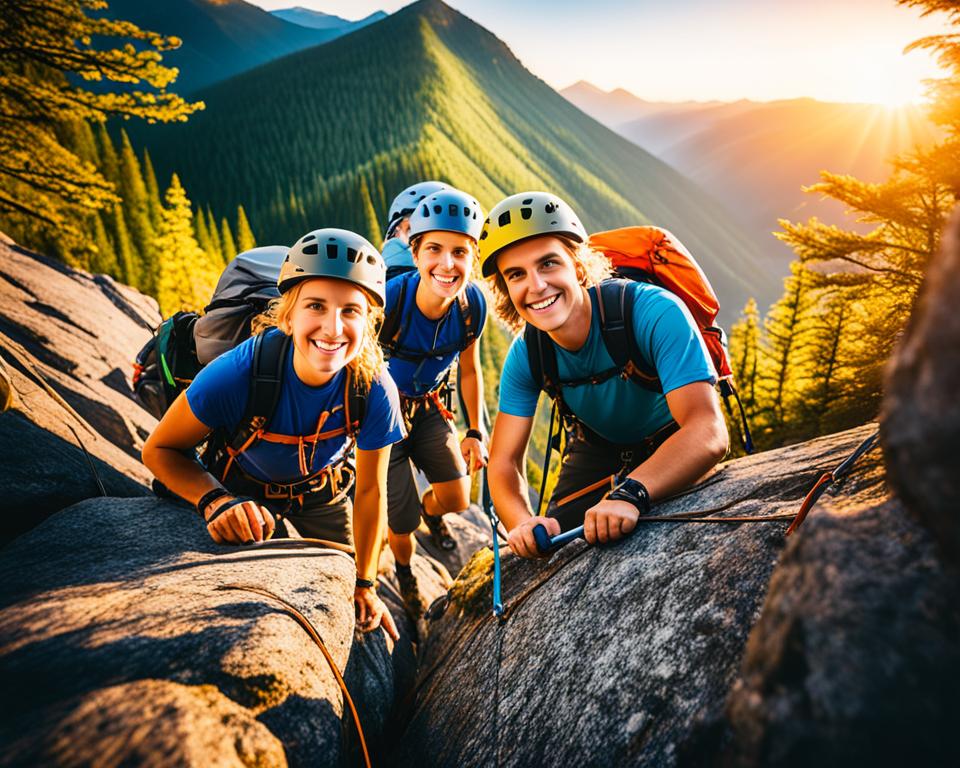
In summary, outdoor adventure programs serve as catalysts for innovation by providing students with experiences that push the boundaries of their comfort zones, promote teamwork and collaboration, foster adaptability and resilience, and encourage creativity and unconventional thinking. These programs play a crucial role in nurturing the next generation of innovative thinkers and problem solvers who are equipped to tackle the complex challenges of the future.
Nurturing Global Citizens through Outdoor Education Curriculum
The outdoor education curriculum plays a significant role in nurturing global citizens and empowering the next generation of eco-conscious leaders. By providing students with opportunities to engage with nature and connect to global environmental issues, outdoor education equips them with the knowledge, skills, and values needed to make a positive impact on the world.
Connecting Students to Global Environmental Issues
Through outdoor education curriculum, students are exposed to a wide range of global environmental issues, such as climate change, deforestation, and pollution. They learn about the interconnectedness of ecosystems and the impact of human actions on the environment. By understanding these issues, students develop a sense of responsibility and a deep appreciation for the need to protect and preserve our planet.
Outdoor education programs often incorporate field trips, nature expeditions, and experiential learning activities that allow students to witness the effects of global environmental issues firsthand. This immersive approach fosters a personal connection to the challenges faced by different regions and communities around the world.
For example, students may have the opportunity to visit a coastal area affected by rising sea levels, where they can see the devastating impact on local ecosystems and communities. By witnessing the consequences of environmental degradation, students gain a deeper understanding of the urgency and importance of taking action.
Empowering the Next Generation of Eco-conscious Leaders
Outdoor education curriculum aims to empower students to become eco-conscious leaders who are equipped to address the complex environmental challenges of the 21st century. By combining hands-on learning experiences with opportunities for reflection and critical thinking, outdoor education fosters the development of leadership skills and a sense of agency.
Outdoor education programs often incorporate elements of teamwork, collaboration, and problem-solving. Students engage in group projects that require them to analyze environmental issues, develop sustainable solutions, and take action in their own communities. Through these experiences, students develop the confidence and skills needed to initiate positive change.
Furthermore, outdoor education encourages students to embrace a lifelong commitment to environmental stewardship. By instilling a love for nature and a deep understanding of the interdependence between human well-being and environmental health, outdoor education cultivates a strong sense of responsibility towards the planet and future generations.
The Intersection of Environmental Psychology and Outdoor Learning
The intersection of environmental psychology and outdoor learning provides valuable insights into the impact of nature on human behavior and well-being. Understanding this connection enhances the effectiveness of outdoor learning experiences and promotes positive outcomes for students.
Environmental psychology explores how the natural environment influences human thoughts, emotions, and behaviors. It examines the psychological and emotional responses individuals have towards nature and how these experiences contribute to their overall well-being. Outdoor learning, on the other hand, involves educational activities that take place in natural settings, such as outdoor classrooms, nature reserves, or field trips.
Research has shown that nature has a significant positive impact on mental health, reducing stress and anxiety levels while fostering feelings of calm and relaxation.
By incorporating environmental psychology principles into outdoor learning, educators can design experiences that maximize the benefits of being in nature. For example, incorporating elements like green spaces, natural lighting, and nature sounds can enhance student engagement and concentration. Additionally, outdoor learning provides opportunities for hands-on experiences and real-world applications, which promote deeper learning and knowledge retention.
One key aspect of environmental psychology is the impact of nature on cognitive function and creativity. Being in natural environments has been shown to improve attention, problem-solving skills, and creative thinking. Outdoor learning allows students to engage with the environment in a way that stimulates their cognitive abilities and encourages innovative thinking.
The use of environmental psychology principles in outdoor learning can also foster a sense of environmental responsibility and stewardship among students.
Through direct experiences with nature, students develop a stronger sense of connectedness to the environment and recognize the importance of protecting it for future generations. This sense of environmental responsibility gained through outdoor learning can lead to lifelong practices of sustainability and conservation.

By embracing the intersection of environmental psychology and outdoor learning, educators can create impactful learning experiences that promote sustainable mindsets and empower students to become environmentally conscious global citizens.
Developing Social Conscientiousness through Nature Education Programs
Nature education programs offer a valuable platform for developing social conscientiousness in today’s youth. These programs go beyond traditional classroom settings, providing immersive experiences in the natural world that foster a deep connection to the environment and a sense of responsibility towards our planet. Through engaging activities and hands-on learning, nature education programs empower young individuals to become advocates for sustainability and positive change.
Building Self-Esteem and Self-Discipline in Youth
In addition to nurturing an understanding of environmental issues, nature education programs play a crucial role in building self-esteem and self-discipline in youth. Immersion in the natural world encourages young learners to challenge themselves, overcome obstacles, and develop a sense of accomplishment. Whether it’s conquering a challenging hike or learning new outdoor skills, these experiences contribute to the development of self-confidence and self-discipline, qualities that will benefit them throughout their lives.

Encouraging Proactive Change Agency and Social Empathy
Nature education programs not only cultivate a love for the outdoors but also inspire young individuals to take proactive actions for a sustainable future. By imparting knowledge about the interconnectedness of nature and human well-being, these programs instill a sense of responsibility and empathy towards the Earth and its inhabitants. Through hands-on projects and collaborative discussions, students learn how their actions can make a positive impact on the environment and society. They develop a proactive change agency mindset, understanding that even small actions can create significant ripple effects.
Conclusion
In conclusion, outdoor learning is a powerful tool for cultivating sustainable mindsets among students. By immersing themselves in nature-based experiences, students develop a deep love and respect for the environment. Through outdoor learning, students also cultivate critical thinking and problem-solving skills, enabling them to tackle environmental challenges with creativity and innovation. Moreover, outdoor learning equips students with the knowledge and values necessary to create a more sustainable future.
By embracing outdoor learning, we empower the next generation to become environmentally conscious and responsible global citizens. This holistic approach to education fosters a sense of responsibility and advocacy for the environment, leading to positive actions and sustainable change. Outdoor learning provides students with firsthand experiences that enhance their understanding and appreciation of the natural world, laying the foundation for a lifelong commitment to environmental stewardship.
Furthermore, outdoor learning complements and enhances the principles of environmental education. It offers a dynamic and experiential approach to learning, engaging students both intellectually and emotionally. By connecting students to nature and allowing them to engage with real-world environmental issues, outdoor learning helps develop a personal connection and a sense of urgency to protect and preserve our planet.
